
MMStar
This repo contains evaluation code for the paper "Are We on the Right Way for Evaluating Large Vision-Language Models"
Stars: 84
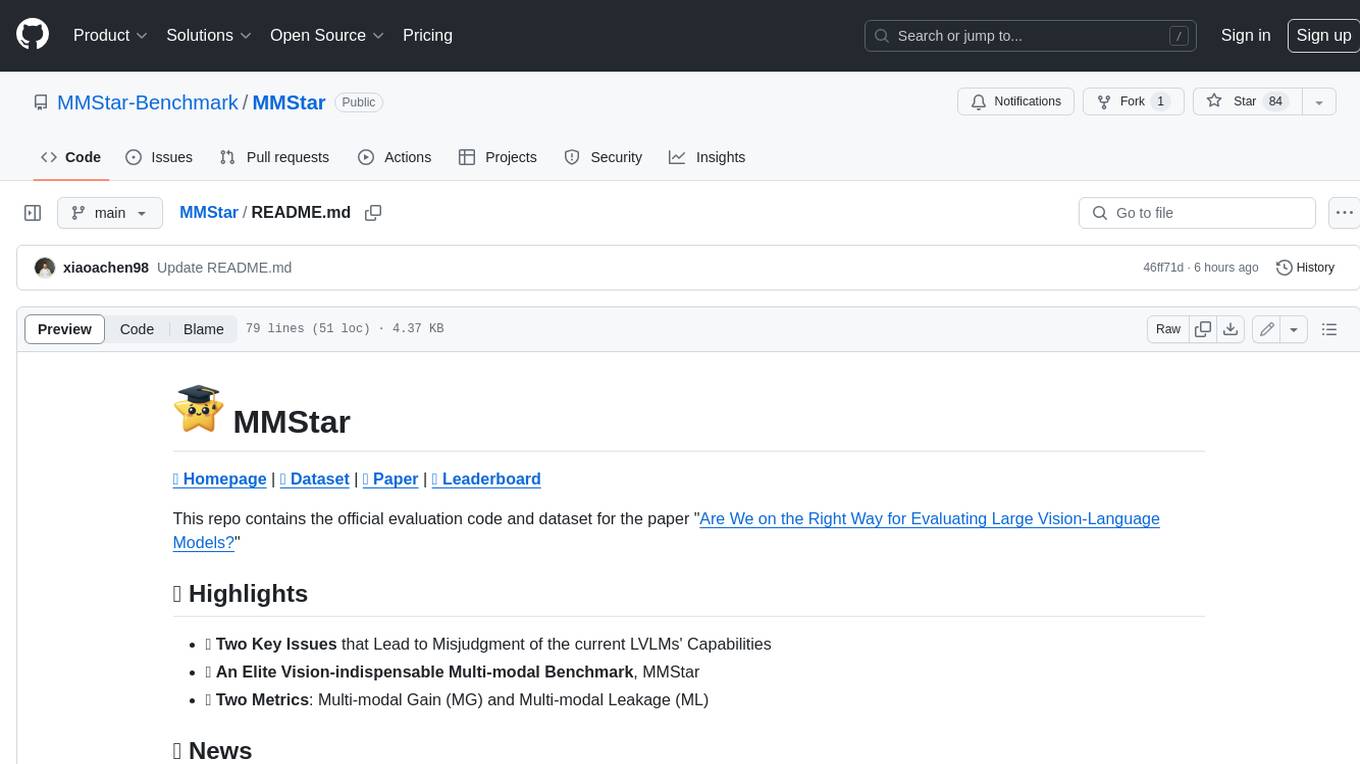
MMStar is an elite vision-indispensable multi-modal benchmark comprising 1,500 challenge samples meticulously selected by humans. It addresses two key issues in current LLM evaluation: the unnecessary use of visual content in many samples and the existence of unintentional data leakage in LLM and LVLM training. MMStar evaluates 6 core capabilities across 18 detailed axes, ensuring a balanced distribution of samples across all dimensions.
README:
🌐 Homepage | 🤗 Dataset | 📖 Paper | 🏆 Leaderboard
This repo contains the official evaluation code and dataset for the paper "Are We on the Right Way for Evaluating Large Vision-Language Models?"
- 🔥 Two Key Issues that Lead to Misjudgment of the current LVLMs' Capabilities
- 🔥 An Elite Vision-indispensable Multi-modal Benchmark, MMStar
- 🔥 Two Metrics: Multi-modal Gain (MG) and Multi-modal Leakage (ML)
[2024.4.16] 🚀 MMStar has been supported in the VLMEvalKit repository and OpenCompass leaderboard.
[2024.4.2] 🚀 Huggingface Dataset and evaluation code are available!
[2024.4.1] 🚀 We released the ArXiv paper.
- [x] Evaluation code for MMStar
- [x] Support online Leaderboard
- [ ] Curate online test set, MMStar-test (This involves working with the existing multi-modal benchmarks containing protected test set, feel free to contact us!)
We dig into current evaluation works and identify two primary issues:
(1) Visual content is unnecessary for many samples.
(2) Unintentional data leakage exists in LLM and LVLM training.
Both problems lead to misjudgments of actual multi-modal performance gains and potentially misguide the study of LVLM. To this end, we present MMStar, an elite vision-indispensable multi-modal benchmark comprising 1,500 challenge samples meticulously selected by humans. After applying the coarse filter process and manual review, we narrow down from a total of 22,401 samples to 11,607 candidate samples and finally select 1,500 high-quality samples to construct our MMStar benchmark.
In MMStar, we display 6 core capabilities in the inner ring, with 18 detailed axes presented in the outer ring. The middle ring showcases the number of samples for each detailed dimension. Each core capability contains a meticulously balanced 250 samples. We further ensure a relatively even distribution across the 18 detailed axes.
You can evaluate any LLMs and LVLMs on our MMStar following with the evaluation guidelines.
🎯 The Leaderboard for MMStar is continuously being updated, welcoming the contribution of your LVLMs!
Please note that to thoroughly evaluate your own LVLM, you are required to provide us with three result files in xlsx format. These should include the results of your LVLM with visual input, the results of your LVLM without visual input, and the results of your original LLM base without visual input. We have provided a submission format in the submits folder. After completing the aforementioned steps, please contact us via [email protected] to submit your results and to update the leaderboard.
If you find our work helpful for your research, please consider giving a star ⭐ and citation 📝
@article{chen2024we,
title={Are We on the Right Way for Evaluating Large Vision-Language Models?},
author={Chen, Lin and Li, Jinsong and Dong, Xiaoyi and Zhang, Pan and Zang, Yuhang and Chen, Zehui and Duan, Haodong and Wang, Jiaqi and Qiao, Yu and Lin, Dahua and others},
journal={arXiv preprint arXiv:2403.20330},
year={2024}
}For Tasks:
Click tags to check more tools for each tasksFor Jobs:
Alternative AI tools for MMStar
Similar Open Source Tools

MMStar
MMStar is an elite vision-indispensable multi-modal benchmark comprising 1,500 challenge samples meticulously selected by humans. It addresses two key issues in current LLM evaluation: the unnecessary use of visual content in many samples and the existence of unintentional data leakage in LLM and LVLM training. MMStar evaluates 6 core capabilities across 18 detailed axes, ensuring a balanced distribution of samples across all dimensions.
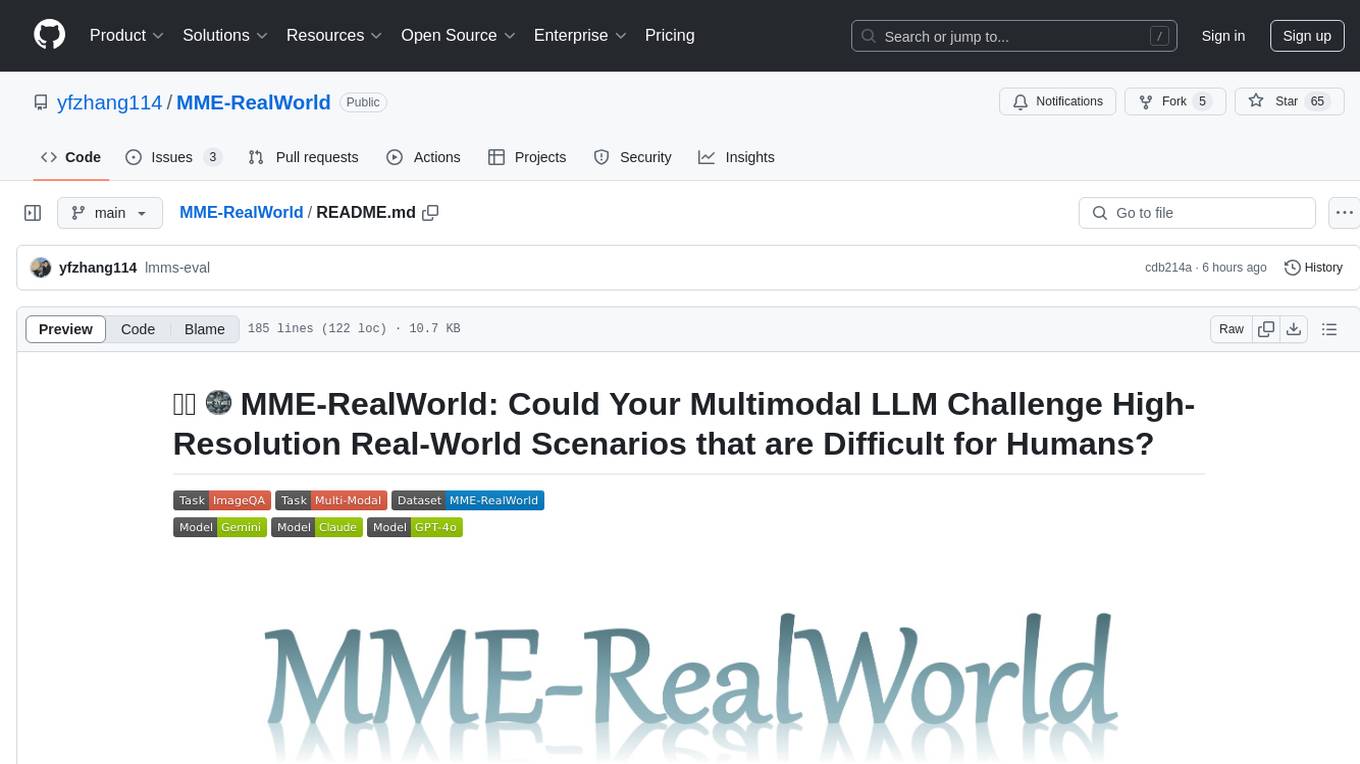
MME-RealWorld
MME-RealWorld is a benchmark designed to address real-world applications with practical relevance, featuring 13,366 high-resolution images and 29,429 annotations across 43 tasks. It aims to provide substantial recognition challenges and overcome common barriers in existing Multimodal Large Language Model benchmarks, such as small data scale, restricted data quality, and insufficient task difficulty. The dataset offers advantages in data scale, data quality, task difficulty, and real-world utility compared to existing benchmarks. It also includes a Chinese version with additional images and QA pairs focused on Chinese scenarios.
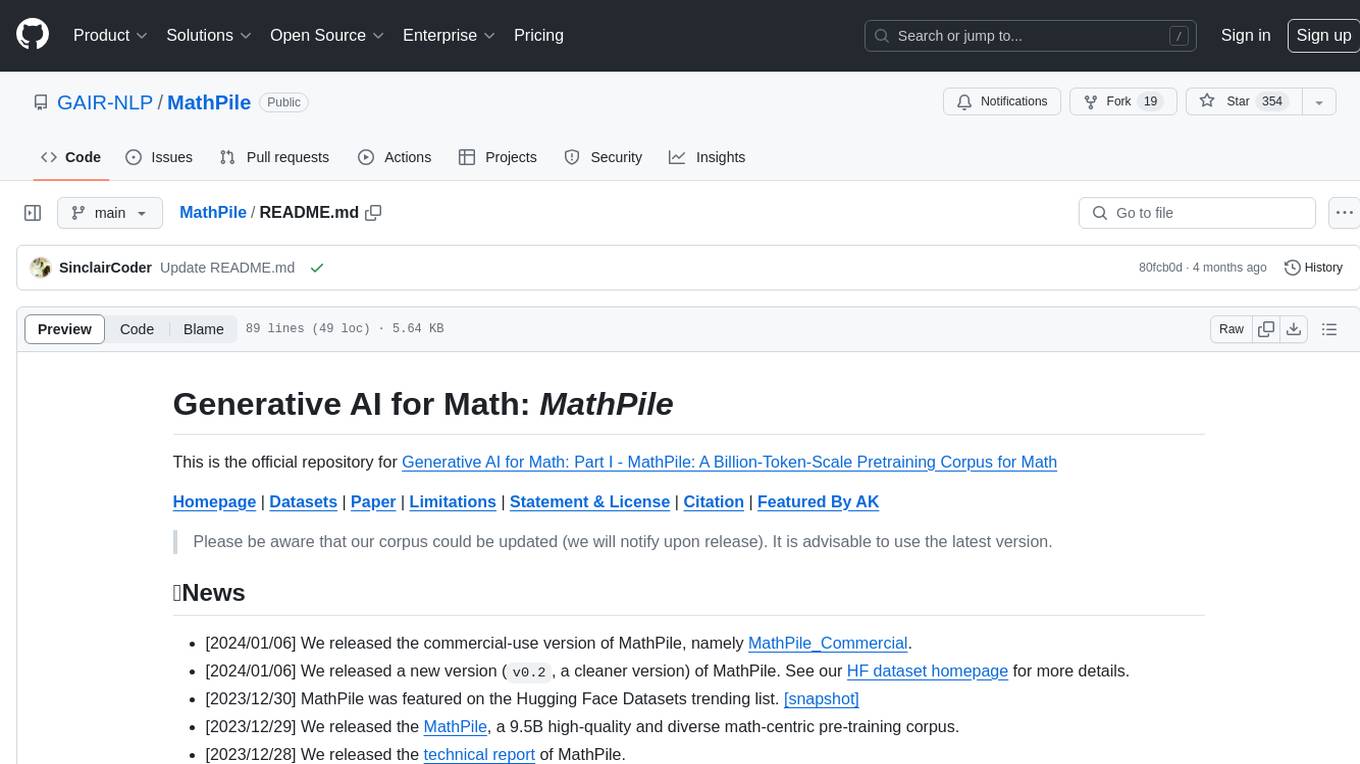
MathPile
MathPile is a generative AI tool designed for math, offering a diverse and high-quality math-centric corpus comprising about 9.5 billion tokens. It draws from various sources such as textbooks, arXiv, Wikipedia, ProofWiki, StackExchange, and web pages, catering to different educational levels and math competitions. The corpus is meticulously processed to ensure data quality, with extensive documentation and data contamination detection. MathPile aims to enhance mathematical reasoning abilities of language models.
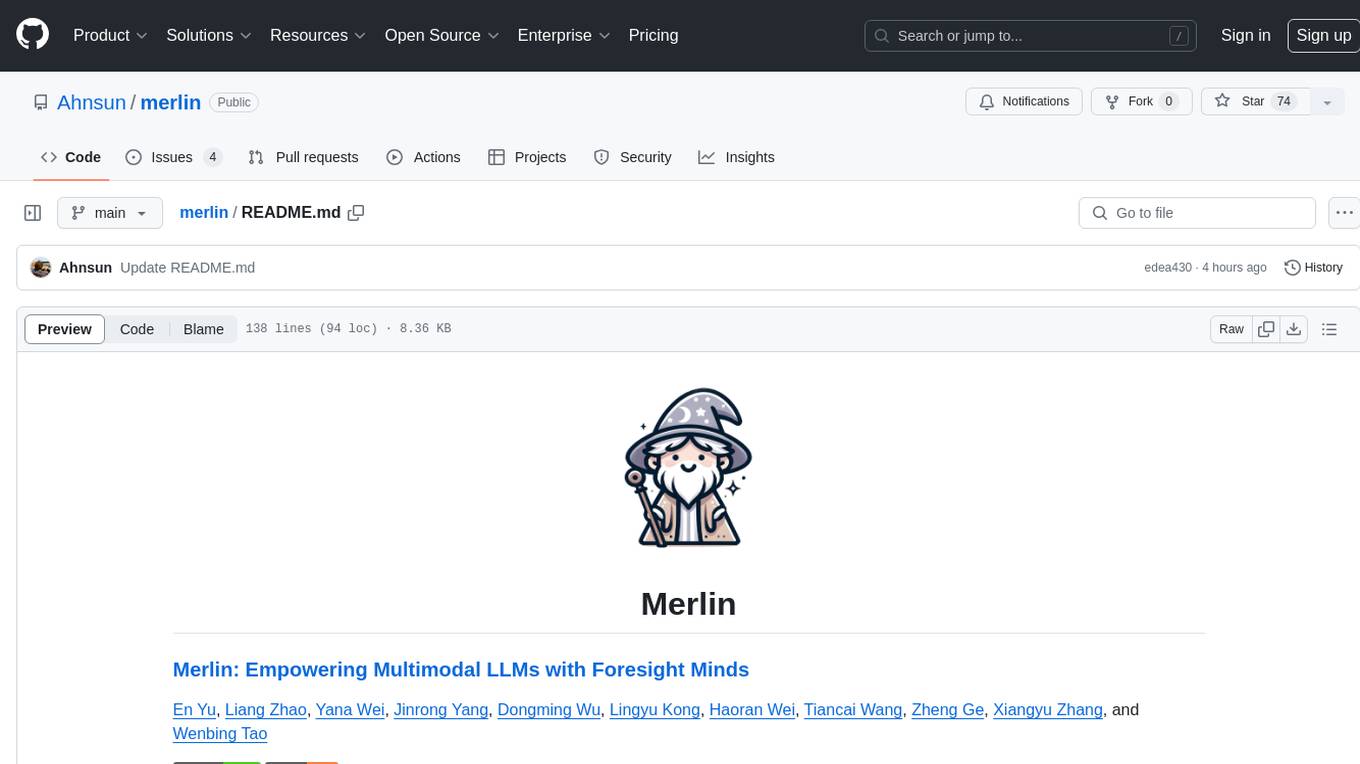
merlin
Merlin is a groundbreaking model capable of generating natural language responses intricately linked with object trajectories of multiple images. It excels in predicting and reasoning about future events based on initial observations, showcasing unprecedented capability in future prediction and reasoning. Merlin achieves state-of-the-art performance on the Future Reasoning Benchmark and multiple existing multimodal language models benchmarks, demonstrating powerful multi-modal general ability and foresight minds.
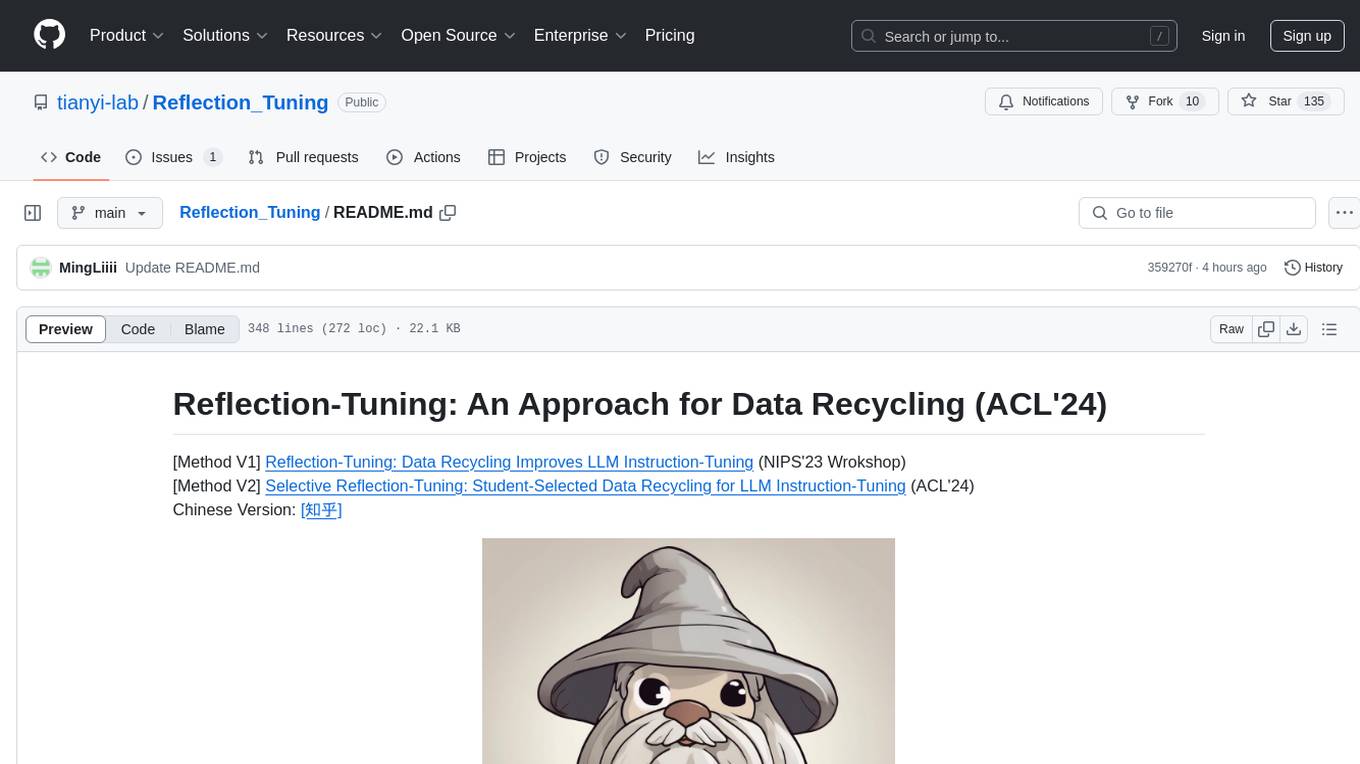
Reflection_Tuning
Reflection-Tuning is a project focused on improving the quality of instruction-tuning data through a reflection-based method. It introduces Selective Reflection-Tuning, where the student model can decide whether to accept the improvements made by the teacher model. The project aims to generate high-quality instruction-response pairs by defining specific criteria for the oracle model to follow and respond to. It also evaluates the efficacy and relevance of instruction-response pairs using the r-IFD metric. The project provides code for reflection and selection processes, along with data and model weights for both V1 and V2 methods.
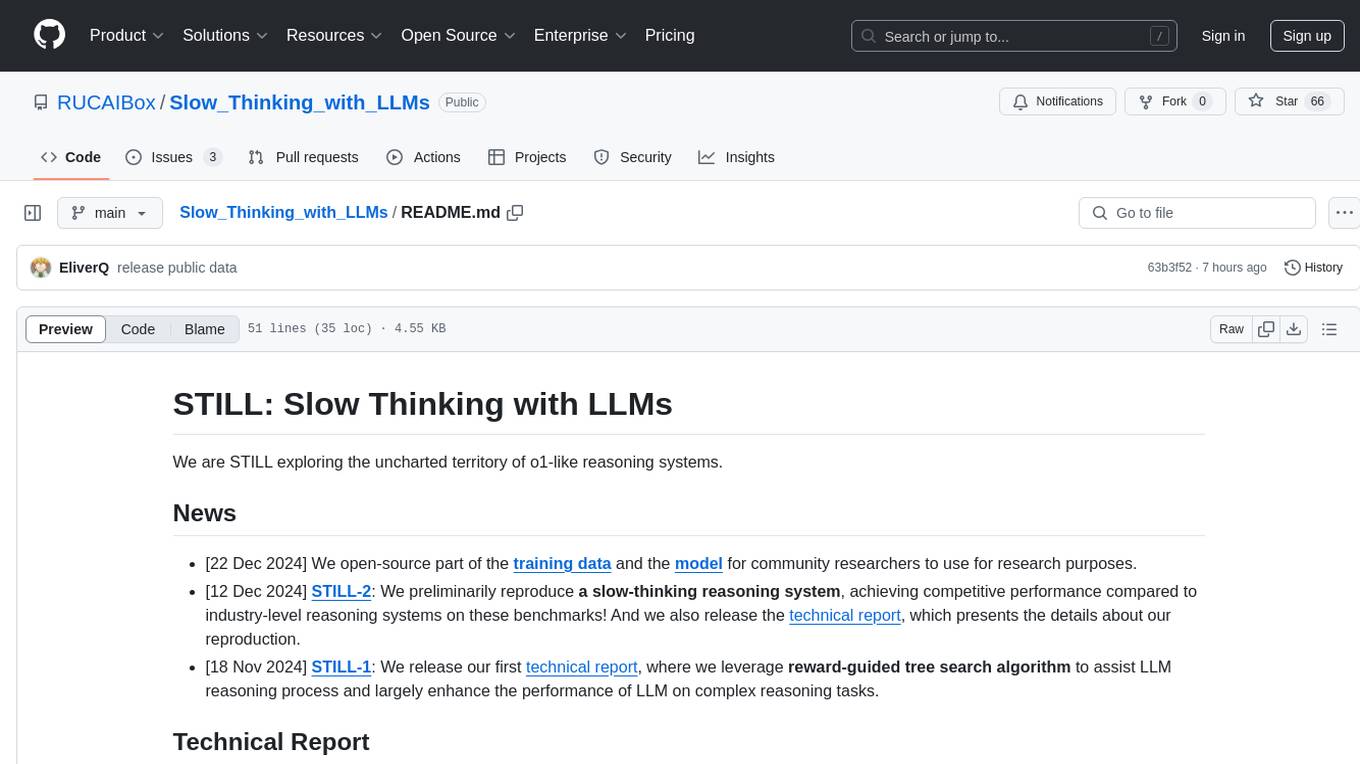
Slow_Thinking_with_LLMs
STILL is an open-source project exploring slow-thinking reasoning systems, focusing on o1-like reasoning systems. The project has released technical reports on enhancing LLM reasoning with reward-guided tree search algorithms and implementing slow-thinking reasoning systems using an imitate, explore, and self-improve framework. The project aims to replicate the capabilities of industry-level reasoning systems by fine-tuning reasoning models with long-form thought data and iteratively refining training datasets.
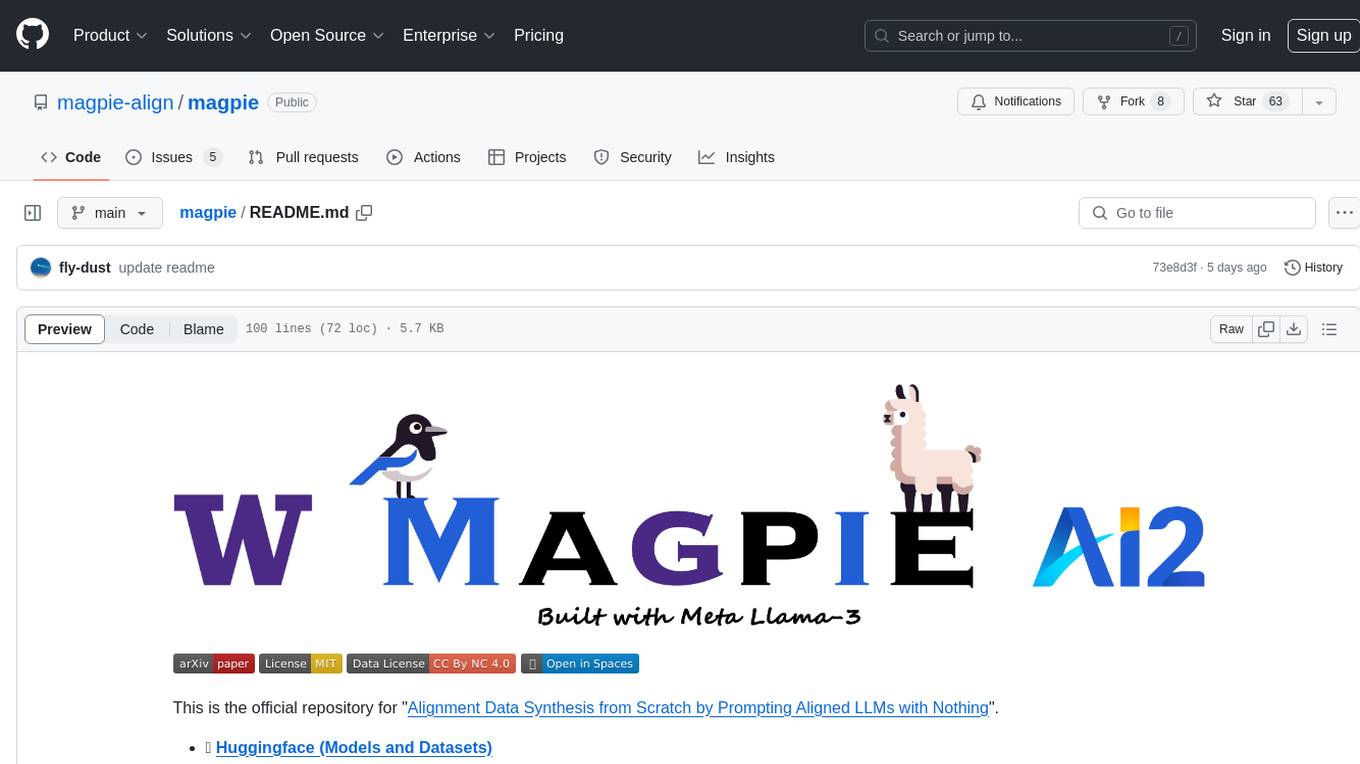
magpie
This is the official repository for 'Alignment Data Synthesis from Scratch by Prompting Aligned LLMs with Nothing'. Magpie is a tool designed to synthesize high-quality instruction data at scale by extracting it directly from an aligned Large Language Models (LLMs). It aims to democratize AI by generating large-scale alignment data and enhancing the transparency of model alignment processes. Magpie has been tested on various model families and can be used to fine-tune models for improved performance on alignment benchmarks such as AlpacaEval, ArenaHard, and WildBench.
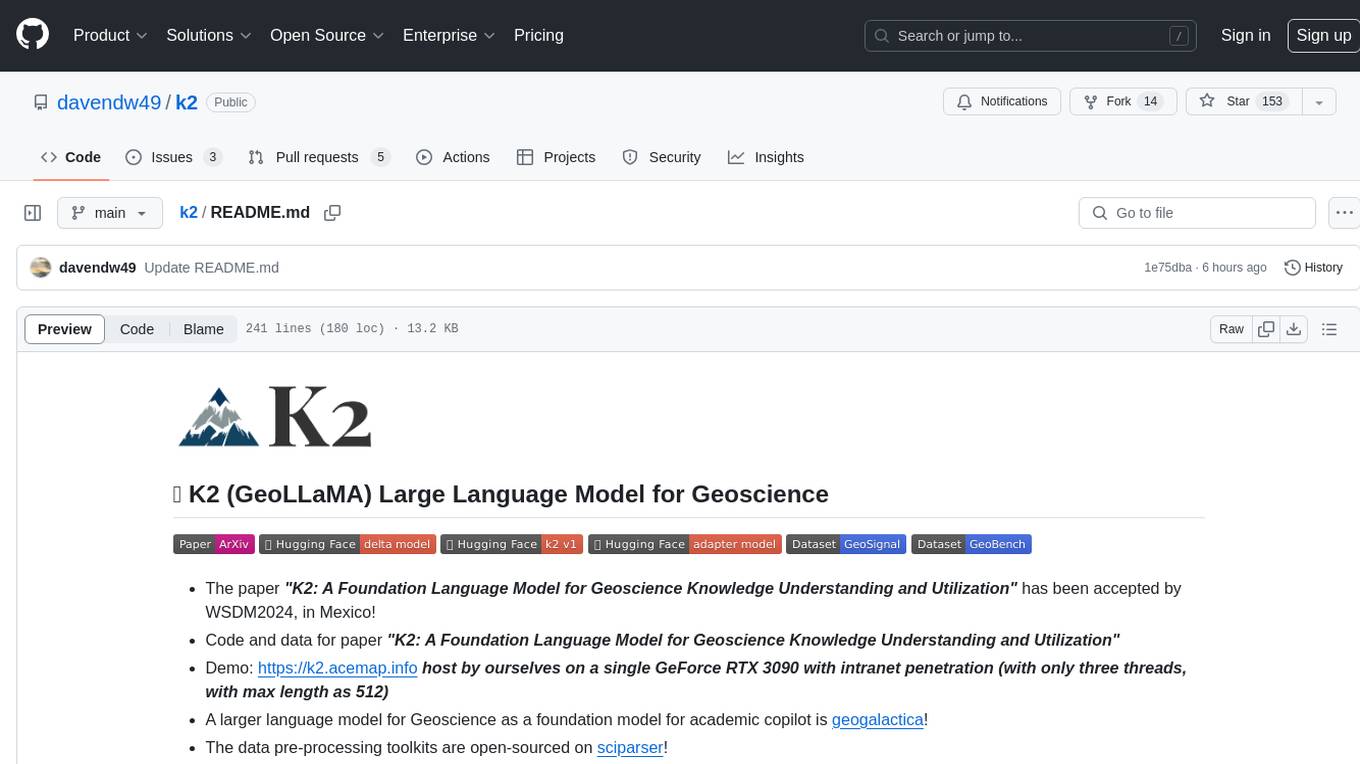
k2
K2 (GeoLLaMA) is a large language model for geoscience, trained on geoscience literature and fine-tuned with knowledge-intensive instruction data. It outperforms baseline models on objective and subjective tasks. The repository provides K2 weights, core data of GeoSignal, GeoBench benchmark, and code for further pretraining and instruction tuning. The model is available on Hugging Face for use. The project aims to create larger and more powerful geoscience language models in the future.
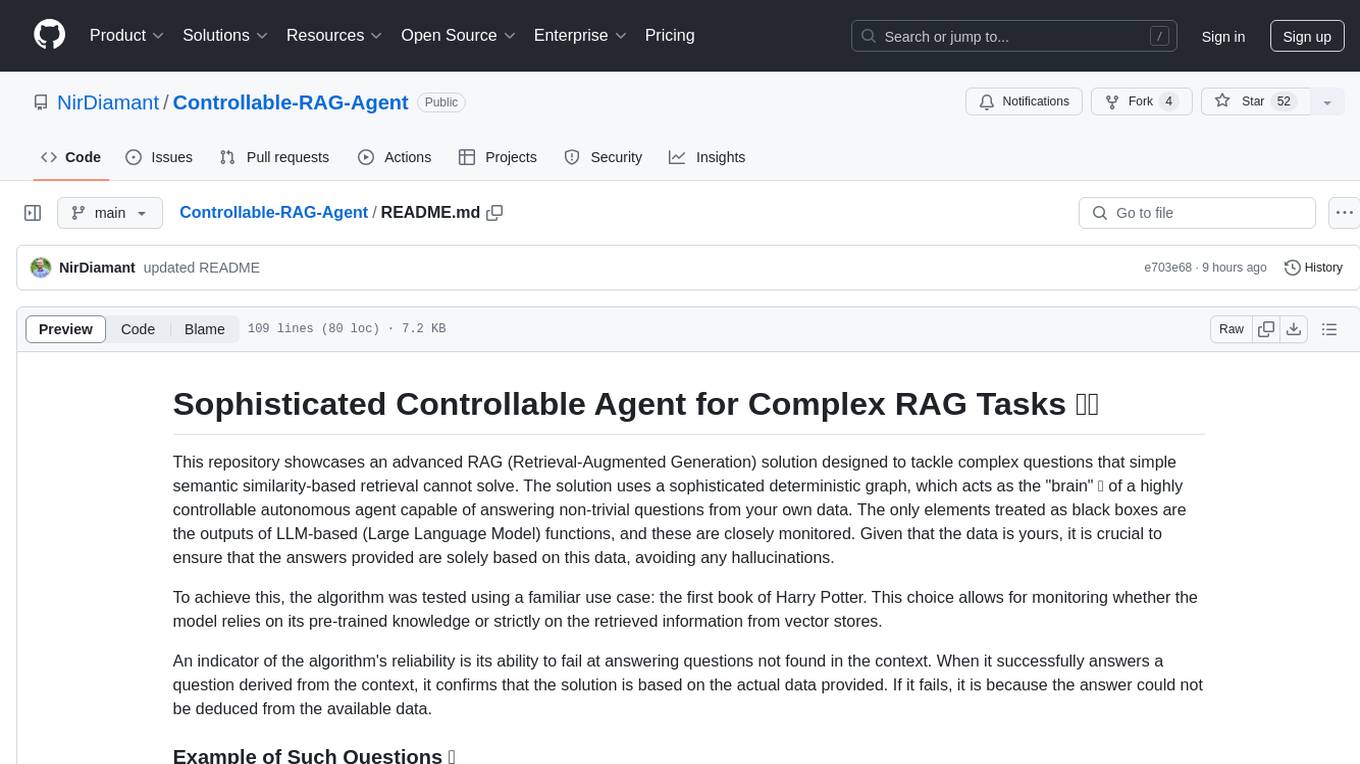
Controllable-RAG-Agent
This repository contains a sophisticated deterministic graph-based solution for answering complex questions using a controllable autonomous agent. The solution is designed to ensure that answers are solely based on the provided data, avoiding hallucinations. It involves various steps such as PDF loading, text preprocessing, summarization, database creation, encoding, and utilizing large language models. The algorithm follows a detailed workflow involving planning, retrieval, answering, replanning, content distillation, and performance evaluation. Heuristics and techniques implemented focus on content encoding, anonymizing questions, task breakdown, content distillation, chain of thought answering, verification, and model performance evaluation.
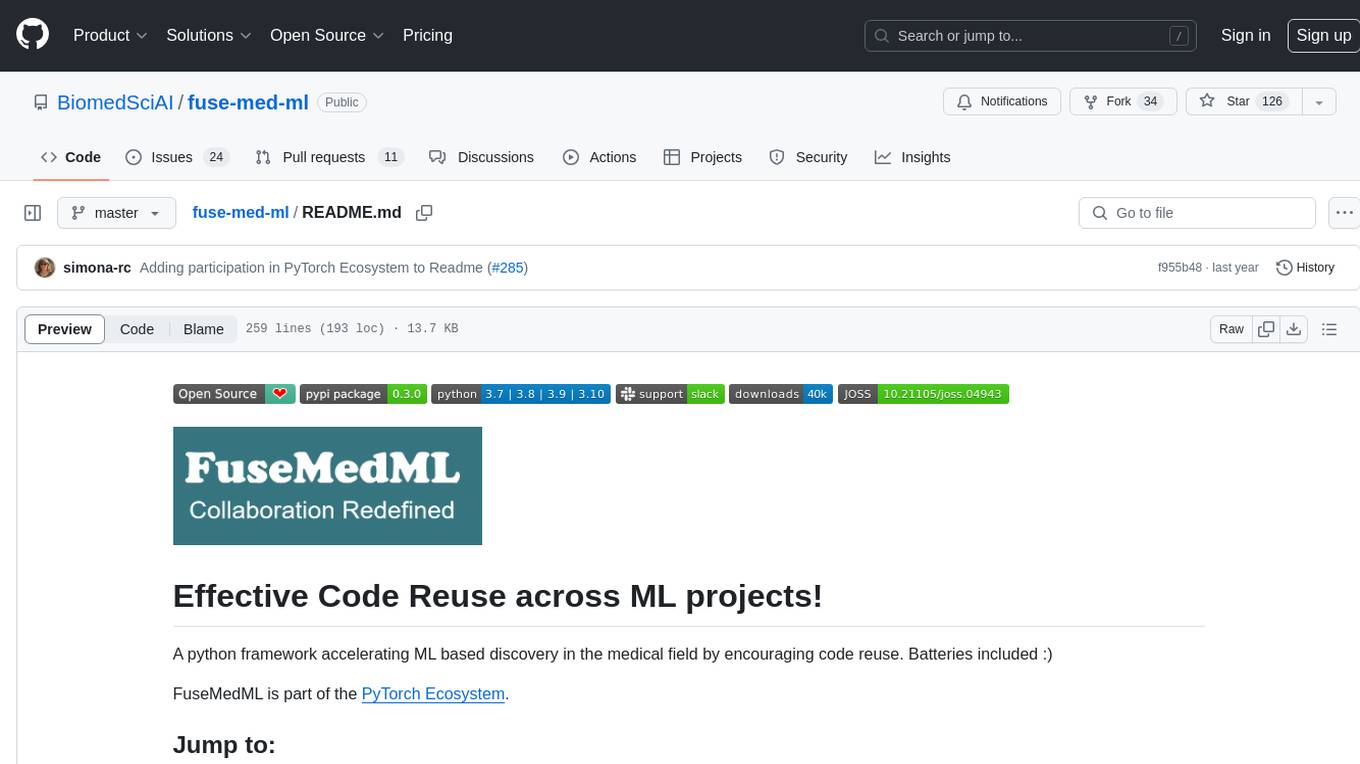
fuse-med-ml
FuseMedML is a Python framework designed to accelerate machine learning-based discovery in the medical field by promoting code reuse. It provides a flexible design concept where data is stored in a nested dictionary, allowing easy handling of multi-modality information. The framework includes components for creating custom models, loss functions, metrics, and data processing operators. Additionally, FuseMedML offers 'batteries included' key components such as fuse.data for data processing, fuse.eval for model evaluation, and fuse.dl for reusable deep learning components. It supports PyTorch and PyTorch Lightning libraries and encourages the creation of domain extensions for specific medical domains.
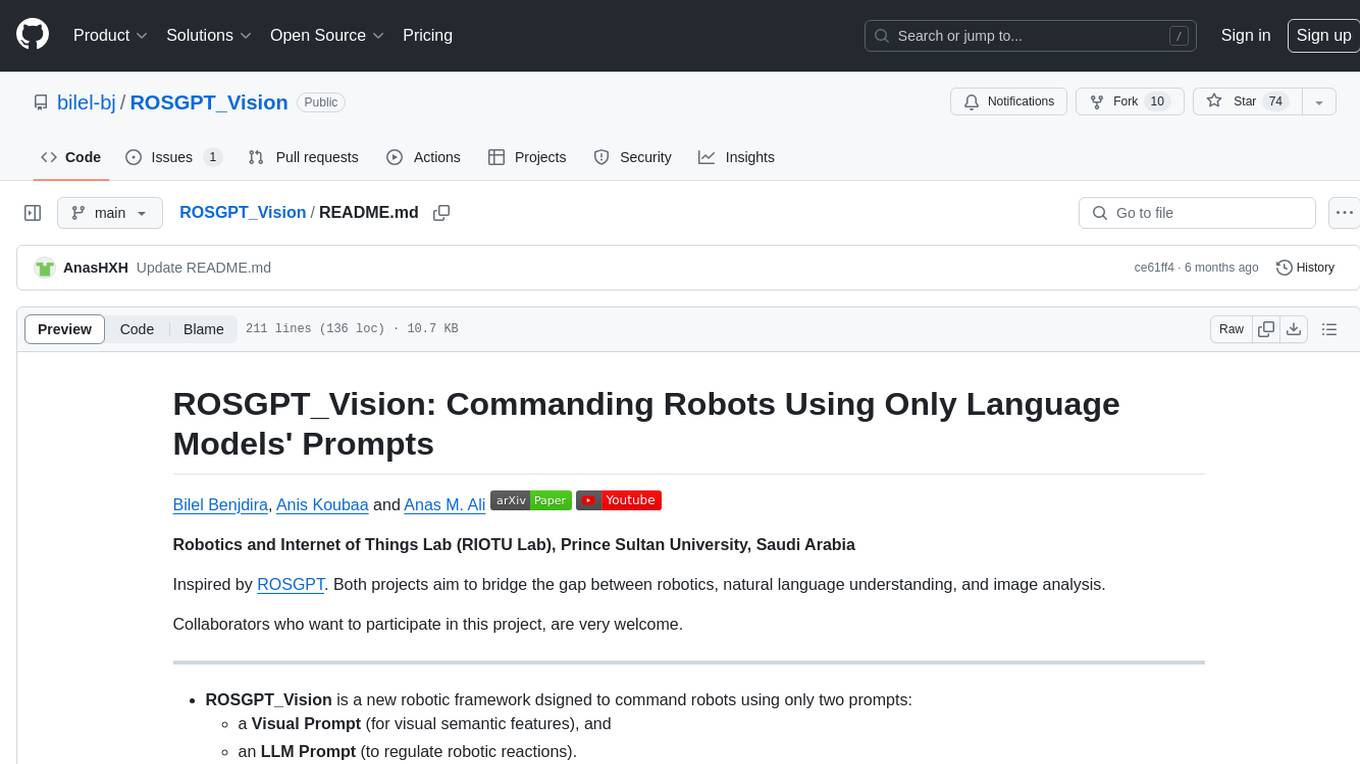
ROSGPT_Vision
ROSGPT_Vision is a new robotic framework designed to command robots using only two prompts: a Visual Prompt for visual semantic features and an LLM Prompt to regulate robotic reactions. It is based on the Prompting Robotic Modalities (PRM) design pattern and is used to develop CarMate, a robotic application for monitoring driver distractions and providing real-time vocal notifications. The framework leverages state-of-the-art language models to facilitate advanced reasoning about image data and offers a unified platform for robots to perceive, interpret, and interact with visual data through natural language. LangChain is used for easy customization of prompts, and the implementation includes the CarMate application for driver monitoring and assistance.
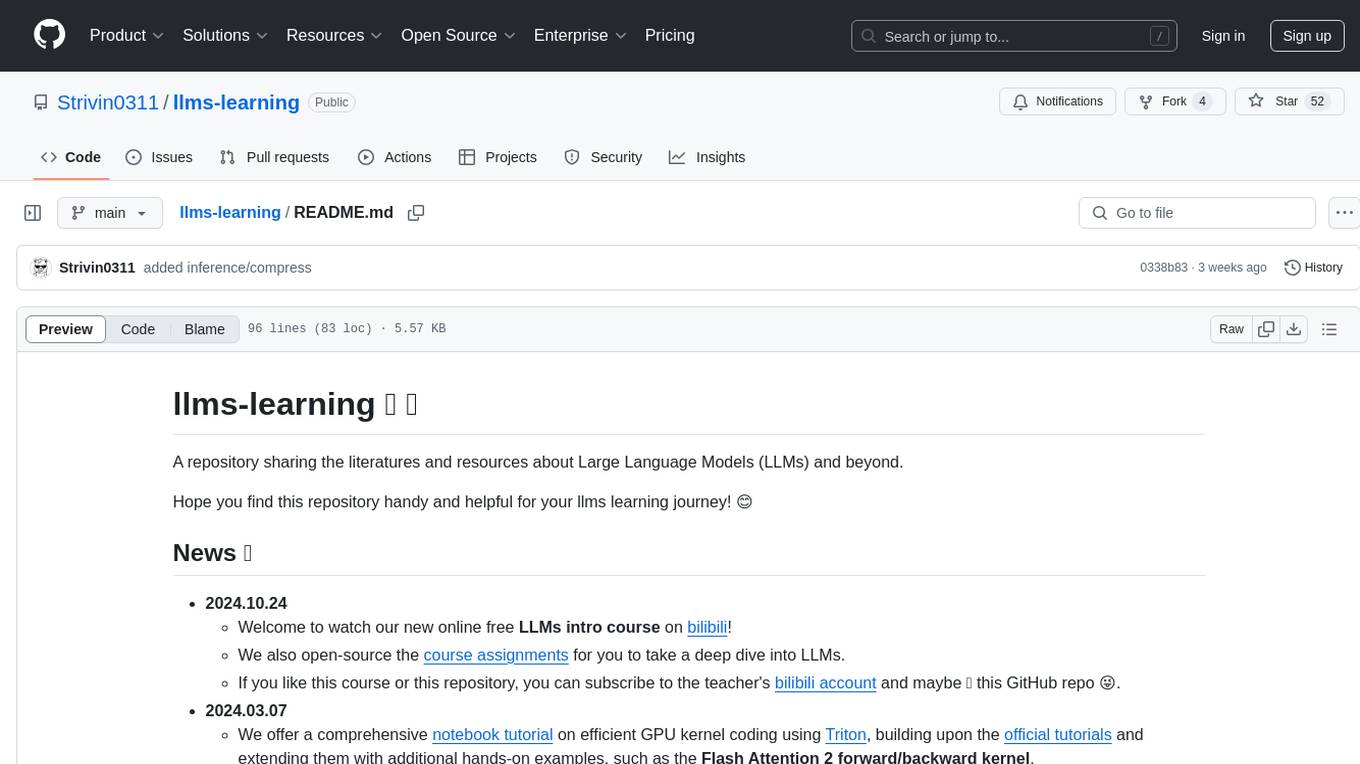
llms-learning
A repository sharing literatures and resources about Large Language Models (LLMs) and beyond. It includes tutorials, notebooks, course assignments, development stages, modeling, inference, training, applications, study, and basics related to LLMs. The repository covers various topics such as language models, transformers, state space models, multi-modal language models, training recipes, applications in autonomous driving, code, math, embodied intelligence, and more. The content is organized by different categories and provides comprehensive information on LLMs and related topics.
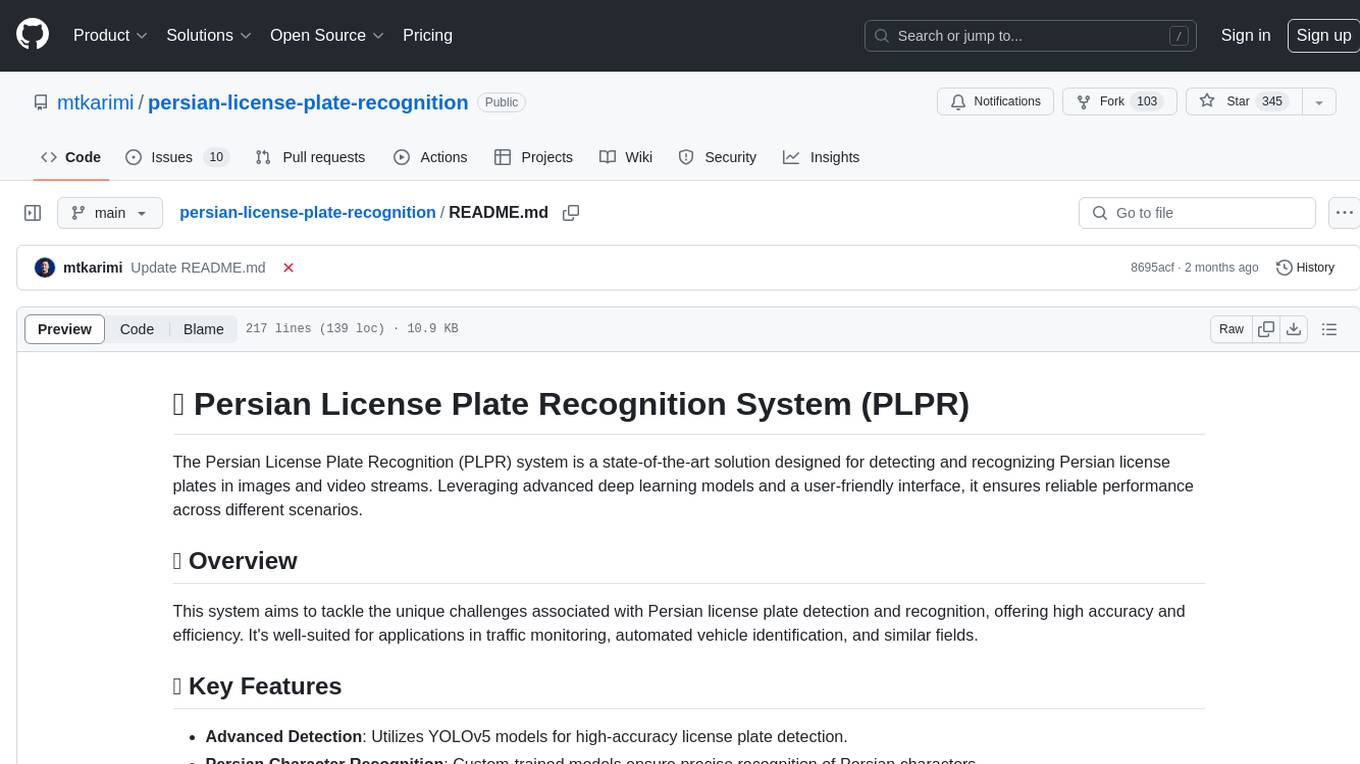
persian-license-plate-recognition
The Persian License Plate Recognition (PLPR) system is a state-of-the-art solution designed for detecting and recognizing Persian license plates in images and video streams. Leveraging advanced deep learning models and a user-friendly interface, it ensures reliable performance across different scenarios. The system offers advanced detection using YOLOv5 models, precise recognition of Persian characters, real-time processing capabilities, and a user-friendly GUI. It is well-suited for applications in traffic monitoring, automated vehicle identification, and similar fields. The system's architecture includes modules for resident management, entrance management, and a detailed flowchart explaining the process from system initialization to displaying results in the GUI. Hardware requirements include an Intel Core i5 processor, 8 GB RAM, a dedicated GPU with at least 4 GB VRAM, and an SSD with 20 GB of free space. The system can be installed by cloning the repository and installing required Python packages. Users can customize the video source for processing and run the application to upload and process images or video streams. The system's GUI allows for parameter adjustments to optimize performance, and the Wiki provides in-depth information on the system's architecture and model training.
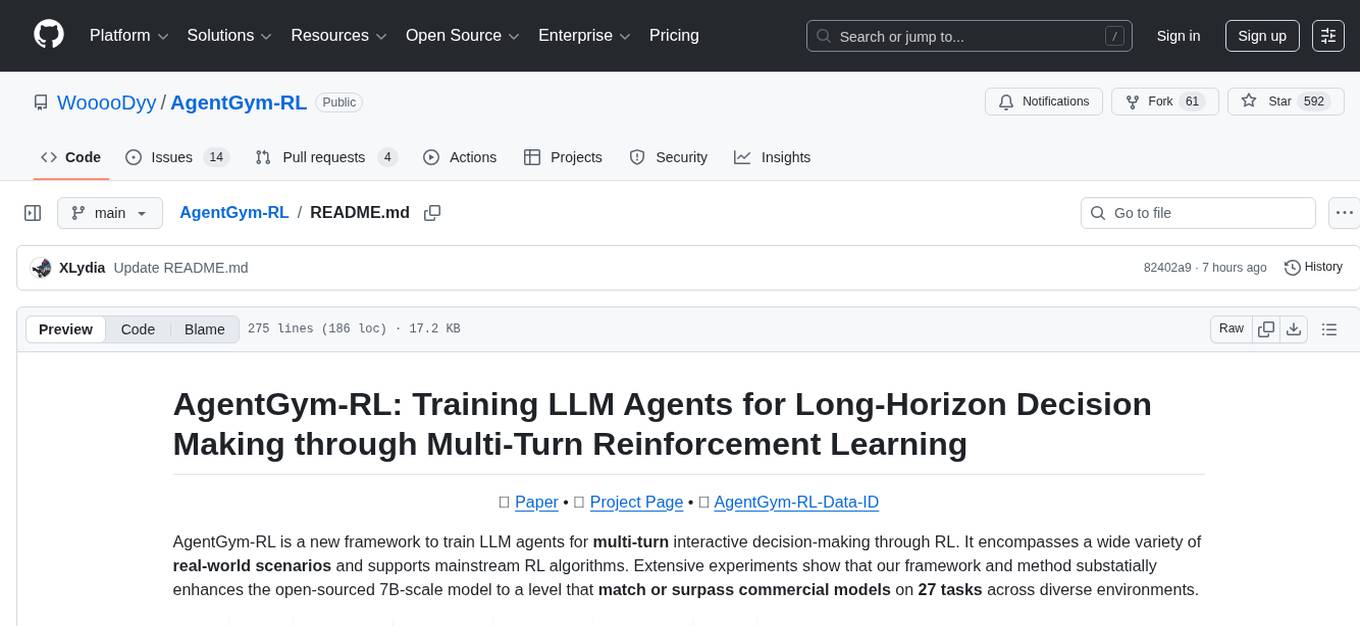
AgentGym-RL
AgentGym-RL is a framework designed to train Long-Long Memory (LLM) agents for multi-turn interactive decision-making through Reinforcement Learning. It addresses challenges in training agents for real-world scenarios by supporting mainstream RL algorithms and introducing the ScalingInter-RL method for stable optimization. The framework includes modular components for environment, agent reasoning, and training pipelines. It offers diverse environments like Web Navigation, Deep Search, Digital Games, Embodied Tasks, and Scientific Tasks. AgentGym-RL also supports various online RL algorithms and post-training strategies. The tool aims to enhance agent performance and exploration capabilities through long-horizon planning and interaction with the environment.
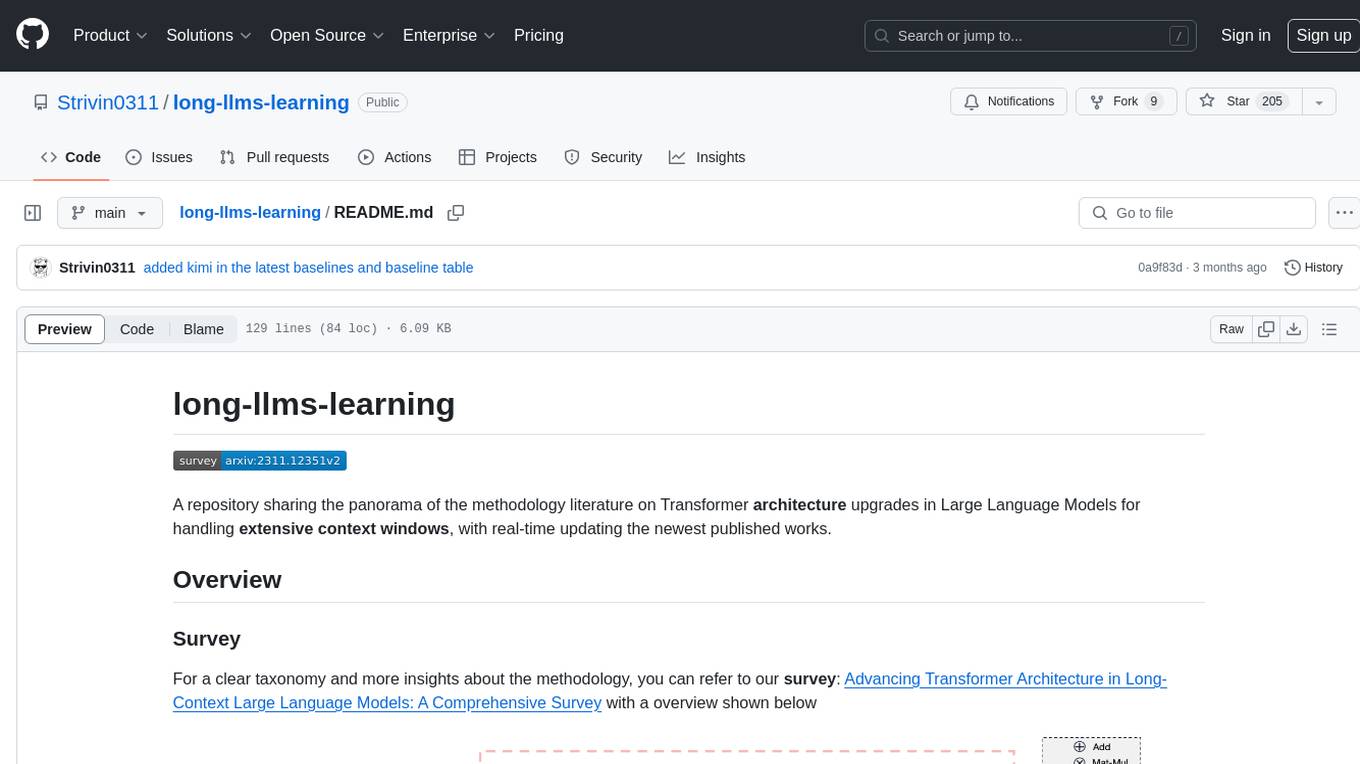
long-llms-learning
A repository sharing the panorama of the methodology literature on Transformer architecture upgrades in Large Language Models for handling extensive context windows, with real-time updating the newest published works. It includes a survey on advancing Transformer architecture in long-context large language models, flash-ReRoPE implementation, latest news on data engineering, lightning attention, Kimi AI assistant, chatglm-6b-128k, gpt-4-turbo-preview, benchmarks like InfiniteBench and LongBench, long-LLMs-evals for evaluating methods for enhancing long-context capabilities, and LLMs-learning for learning technologies and applicated tasks about Large Language Models.
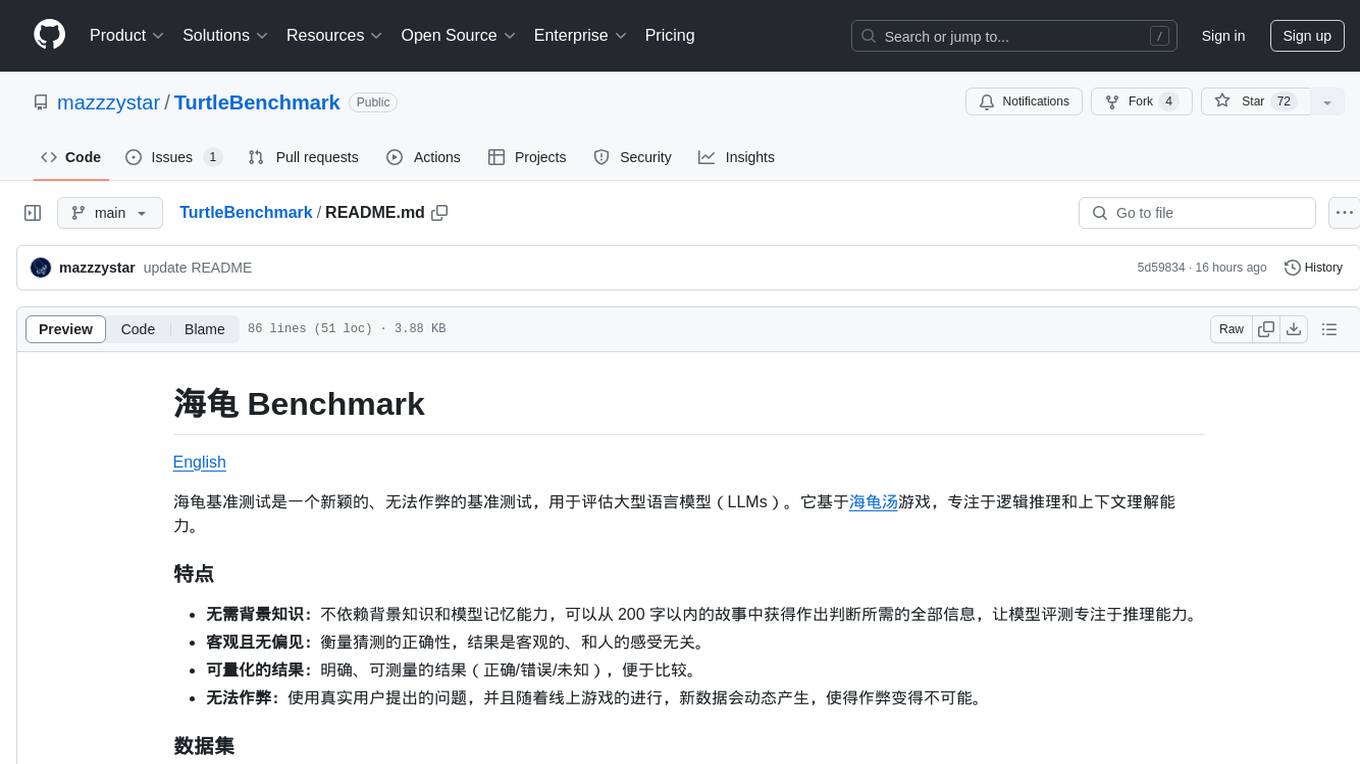
TurtleBenchmark
Turtle Benchmark is a novel and cheat-proof benchmark test used to evaluate large language models (LLMs). It is based on the Turtle Soup game, focusing on logical reasoning and context understanding abilities. The benchmark does not require background knowledge or model memory, providing all necessary information for judgment from stories under 200 words. The results are objective and unbiased, quantifiable as correct/incorrect/unknown, and impossible to cheat due to using real user-generated questions and dynamic data generation during online gameplay.
For similar tasks

MMStar
MMStar is an elite vision-indispensable multi-modal benchmark comprising 1,500 challenge samples meticulously selected by humans. It addresses two key issues in current LLM evaluation: the unnecessary use of visual content in many samples and the existence of unintentional data leakage in LLM and LVLM training. MMStar evaluates 6 core capabilities across 18 detailed axes, ensuring a balanced distribution of samples across all dimensions.
For similar jobs

spear
SPEAR (Simulator for Photorealistic Embodied AI Research) is a powerful tool for training embodied agents. It features 300 unique virtual indoor environments with 2,566 unique rooms and 17,234 unique objects that can be manipulated individually. Each environment is designed by a professional artist and features detailed geometry, photorealistic materials, and a unique floor plan and object layout. SPEAR is implemented as Unreal Engine assets and provides an OpenAI Gym interface for interacting with the environments via Python.

openvino
OpenVINO™ is an open-source toolkit for optimizing and deploying AI inference. It provides a common API to deliver inference solutions on various platforms, including CPU, GPU, NPU, and heterogeneous devices. OpenVINO™ supports pre-trained models from Open Model Zoo and popular frameworks like TensorFlow, PyTorch, and ONNX. Key components of OpenVINO™ include the OpenVINO™ Runtime, plugins for different hardware devices, frontends for reading models from native framework formats, and the OpenVINO Model Converter (OVC) for adjusting models for optimal execution on target devices.
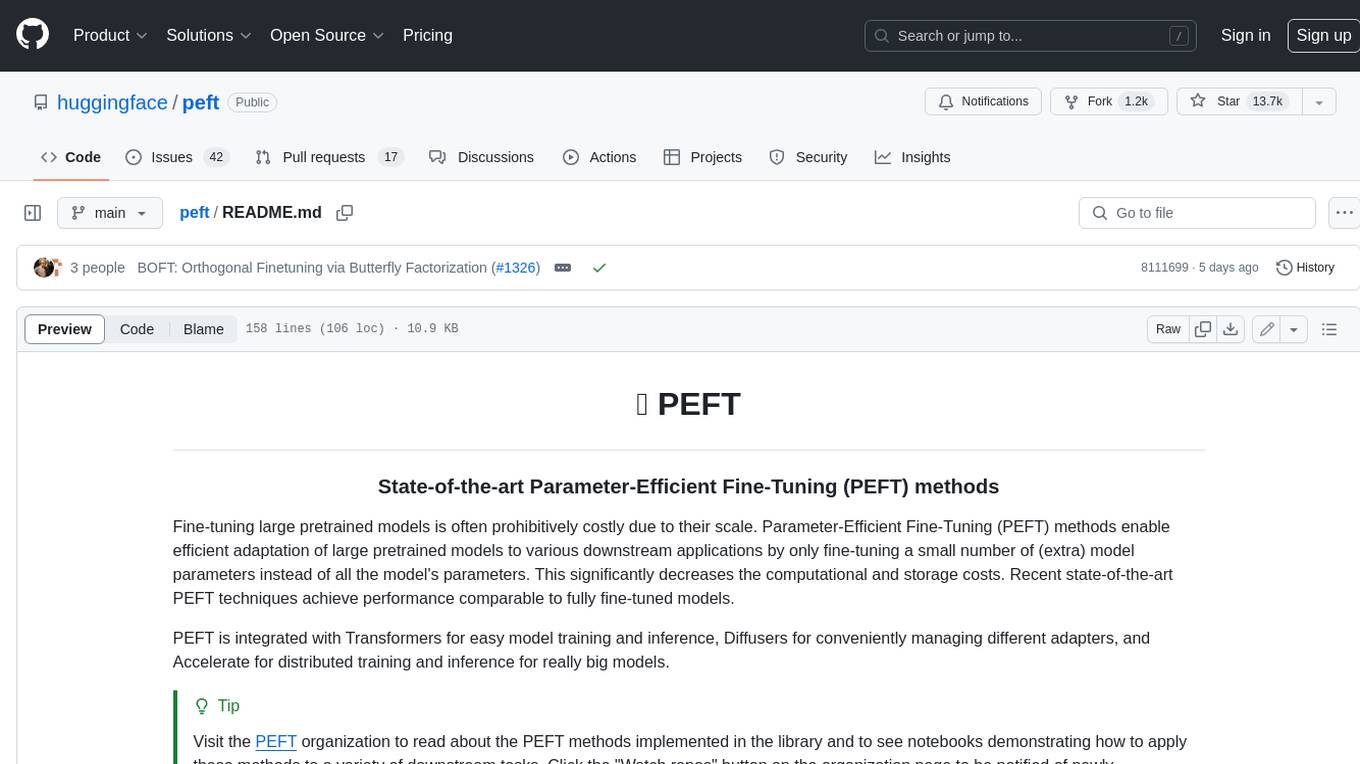
peft
PEFT (Parameter-Efficient Fine-Tuning) is a collection of state-of-the-art methods that enable efficient adaptation of large pretrained models to various downstream applications. By only fine-tuning a small number of extra model parameters instead of all the model's parameters, PEFT significantly decreases the computational and storage costs while achieving performance comparable to fully fine-tuned models.
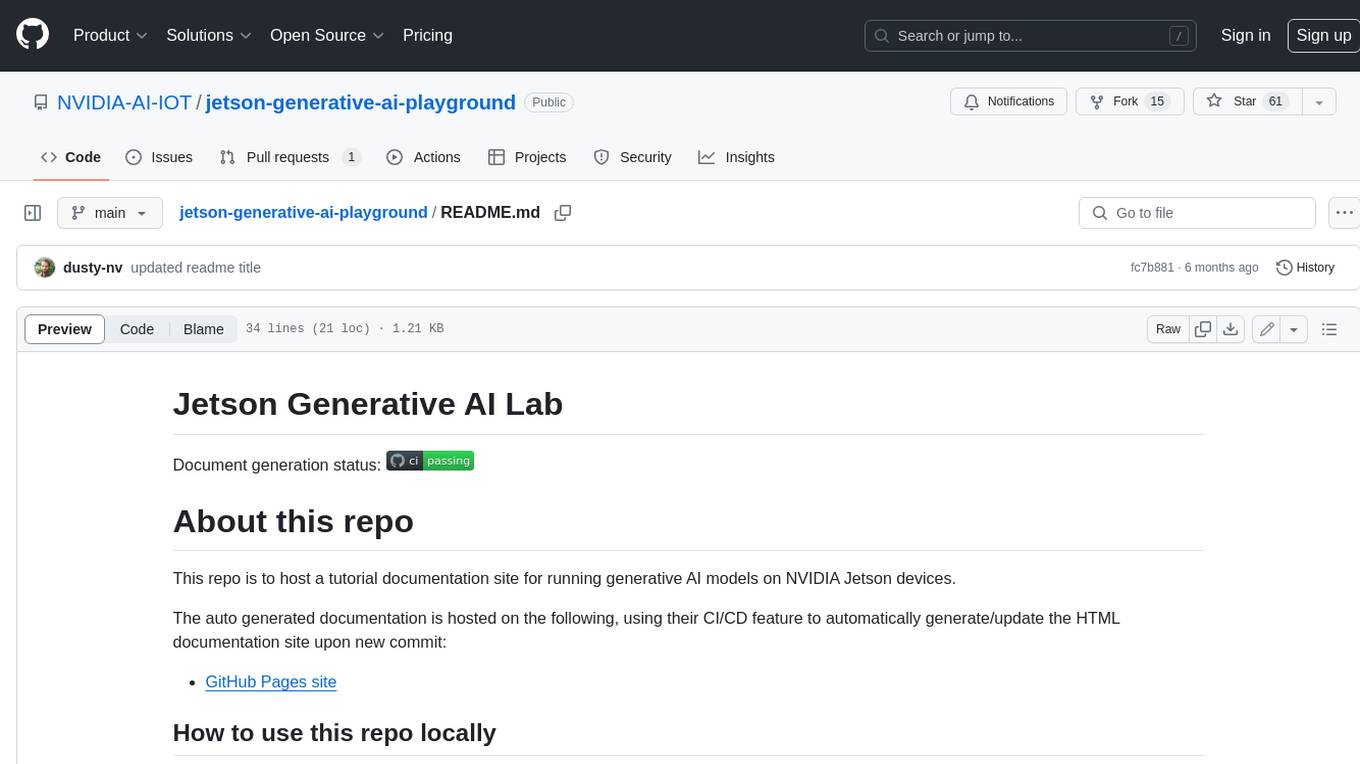
jetson-generative-ai-playground
This repo hosts tutorial documentation for running generative AI models on NVIDIA Jetson devices. The documentation is auto-generated and hosted on GitHub Pages using their CI/CD feature to automatically generate/update the HTML documentation site upon new commits.
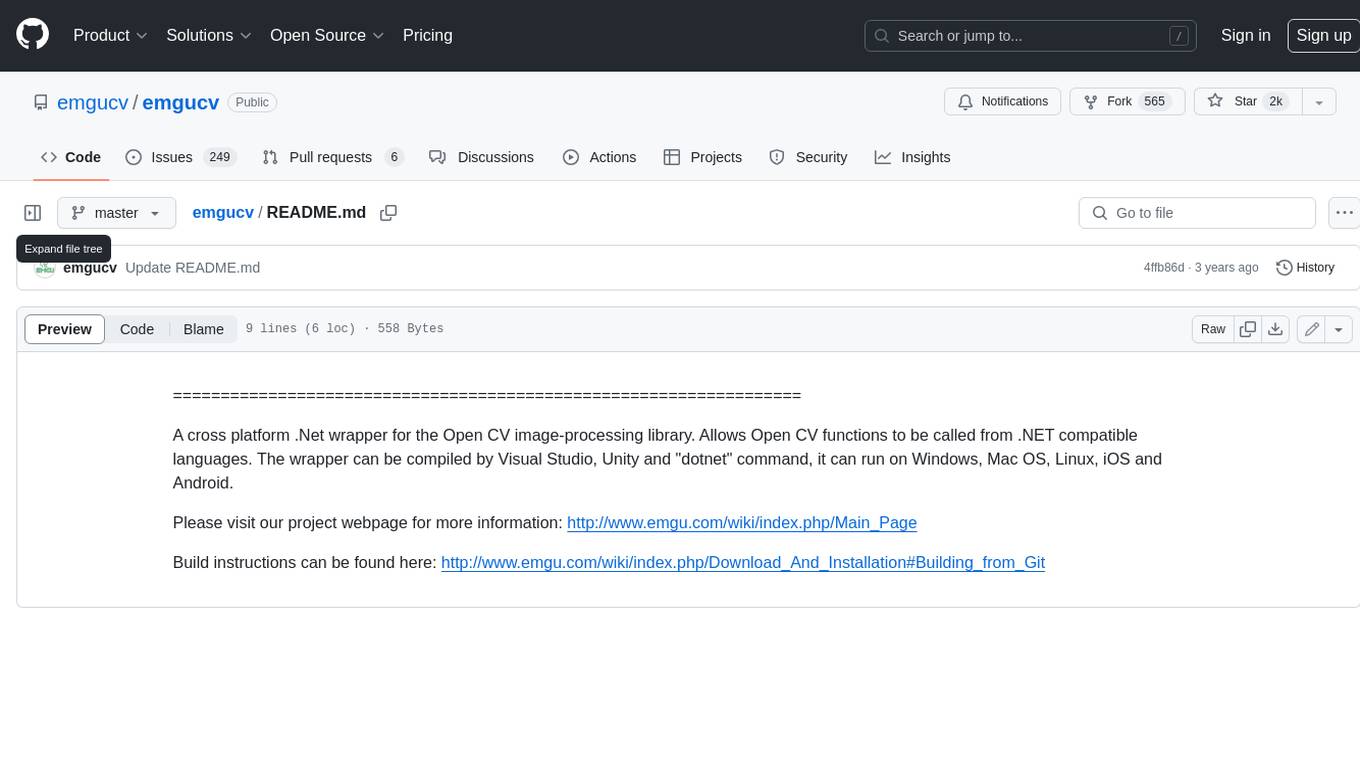
emgucv
Emgu CV is a cross-platform .Net wrapper for the OpenCV image-processing library. It allows OpenCV functions to be called from .NET compatible languages. The wrapper can be compiled by Visual Studio, Unity, and "dotnet" command, and it can run on Windows, Mac OS, Linux, iOS, and Android.

MMStar
MMStar is an elite vision-indispensable multi-modal benchmark comprising 1,500 challenge samples meticulously selected by humans. It addresses two key issues in current LLM evaluation: the unnecessary use of visual content in many samples and the existence of unintentional data leakage in LLM and LVLM training. MMStar evaluates 6 core capabilities across 18 detailed axes, ensuring a balanced distribution of samples across all dimensions.
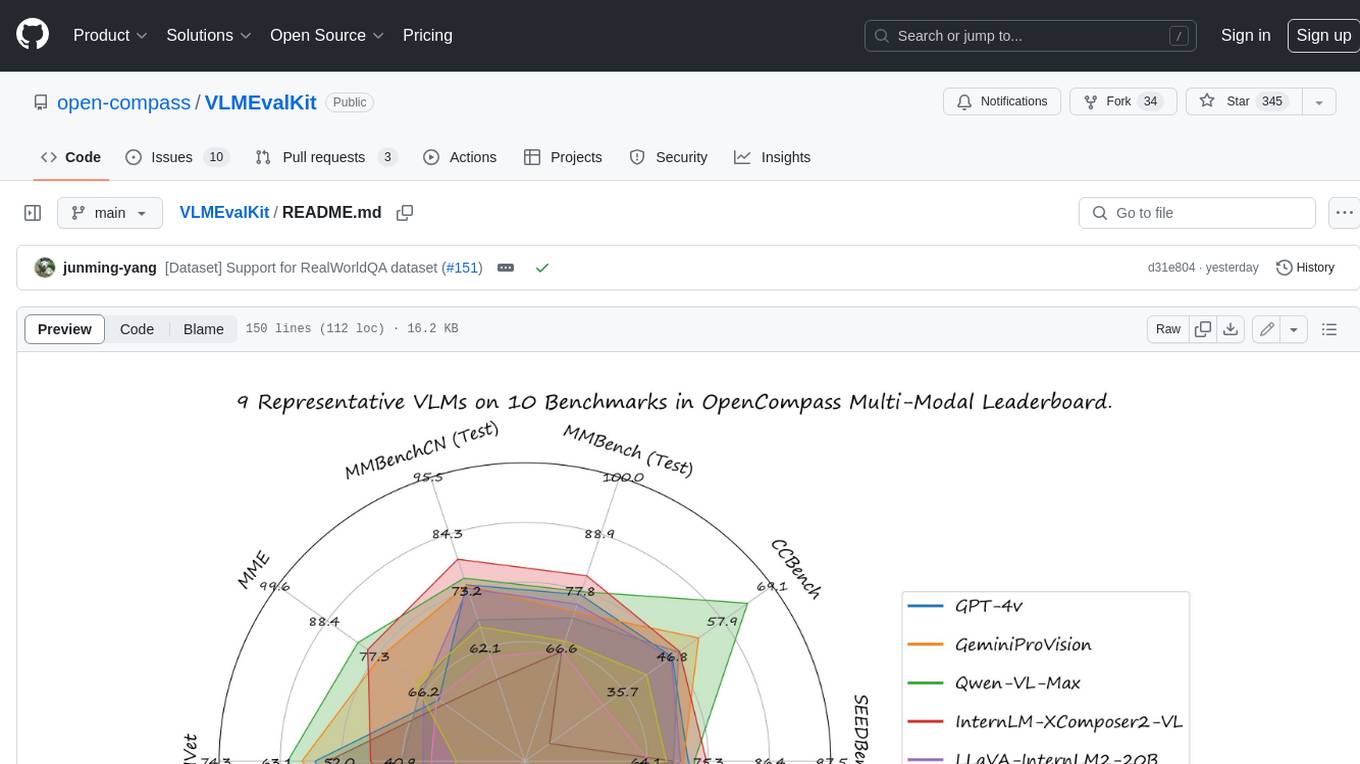
VLMEvalKit
VLMEvalKit is an open-source evaluation toolkit of large vision-language models (LVLMs). It enables one-command evaluation of LVLMs on various benchmarks, without the heavy workload of data preparation under multiple repositories. In VLMEvalKit, we adopt generation-based evaluation for all LVLMs, and provide the evaluation results obtained with both exact matching and LLM-based answer extraction.

llava-docker
This Docker image for LLaVA (Large Language and Vision Assistant) provides a convenient way to run LLaVA locally or on RunPod. LLaVA is a powerful AI tool that combines natural language processing and computer vision capabilities. With this Docker image, you can easily access LLaVA's functionalities for various tasks, including image captioning, visual question answering, text summarization, and more. The image comes pre-installed with LLaVA v1.2.0, Torch 2.1.2, xformers 0.0.23.post1, and other necessary dependencies. You can customize the model used by setting the MODEL environment variable. The image also includes a Jupyter Lab environment for interactive development and exploration. Overall, this Docker image offers a comprehensive and user-friendly platform for leveraging LLaVA's capabilities.




